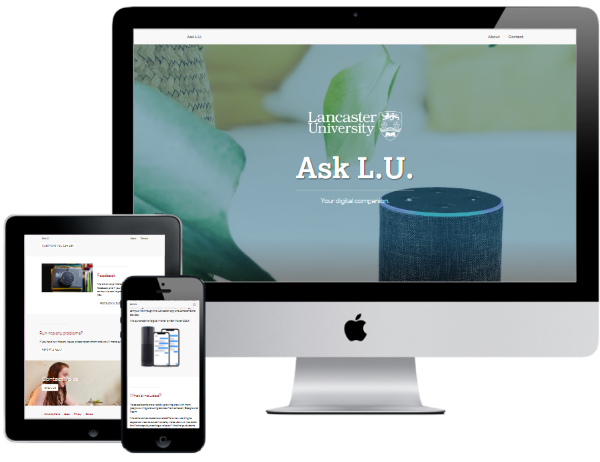This month sees our client Lancaster University launching a pioneering chatbot companion built on Amazon Web Services. It comes hot on the heels of Staffordshire unveiling a service known as Beacon. Is this the beginning of a movement to support students through digital assistants or just a flash in the pan? And are students now starting to expect services to be delivered by both text and voice?
We increasingly use digital assistants like Amazon's Alexa and Google Assistant in our personal lives. Now the academic world is catching on in the UK and beyond.
Lancaster University has become one of the first universities in the UK to launch its own digital assistant. Known as Ask L.U. the app is a digital friend and companion created to help students through their university experience.
The app which is built on Amazon Web Service (AWS) technology answers student’s questions about things like their academic studies, timetabling and campus life through the iLancaster app and Amazon Echo devices.
Is this the dawn of digital assistants in UK institutions?
We’ve talked previously about the power of digital assistants in supporting students and Deakin's Genie app which set the bar in this space after three years of extensive development and testing.
The Ask L.U. features are comparable to Deakin's app, although Genie arguably benefits from more user data and a greater depth of responses having been out in the wild longer. Nevertheless, Ask L.U. has a great starting set of functions and students can get access to a range of academic information, such as the time of their next lecture, or their latest marks and deadlines. On top of this, there is information on student life, such as where they can find a free computer or washing machine near them, or the opening times of shops and bars.
Meanwhile, Staffordshire University has released an app called Beacon which uses either text or voice to get answers to over 400 (and growing) commonly asked questions. Whether a student wants to know when the library closes, seek career advice, check the location of a lecture, find the right society to join or navigate his or her way around campus, Beacon has the answers.
What does the future look like for digital assistants in the UK and globally?
Lancaster University doesn't just see Ask L.U. as a simple assistant. Instead, the institution believes it will become a valuable and integral part of student life at Lancaster and see this usefulness extending to staff members enabling them to coordinate tuition and room bookings.
Staffordshire sees Beacon taking another direction in the future, becoming a crucial relationship building tool. Staff envisage it helping to identify students who are at risk of dropping out or require additional pastoral care.
Other institutions around the world are also using digital assistants to provide students with information. The University of Canberra, for example, are now in the process of developing chatbots to answer general questions from prospective students and helping them figure out whether their ATAR score is good enough to get onto a specific program.
Georgia State University deployed a digital assistant called Pounce to engage prospective students and ensure they turn up when required. Pounce enables the university to "converse" with students at a basic level without having to hire more staff, as well as allowing students to ask questions at all hours.
Also, AdmitHub has been working on installing its conversational AI technology in campuses across the U.S. including at Arizona State University and the University of Memphis. According to an assessment by AdmitHub, from over 50,000 messages sent to students, less than 1 per cent required follow-up responses from human university staff, clearly demonstrating the value digital assistants can provide.
Students and staff are now starting to expect services to be delivered by both text and voice.
Lancaster and Staffordshire Universities have the first mover advantage, and currently, there is nothing else quite like Ask L.U. or Beacon in the UK. However, expect this to change both in the UK and across the world.
The use of voice services is growing exponentially. The benefits of having an intelligent assistant in students' pockets are clear. So will your institution follow in Lancaster and Staffordshire’s footsteps in 2019? If you would like some help, at TERMINALFOUR we are Amazon Web Services Advanced Partners, so we are very happy to help.

:format()//media/Ask-LU---REQ.jpg)
